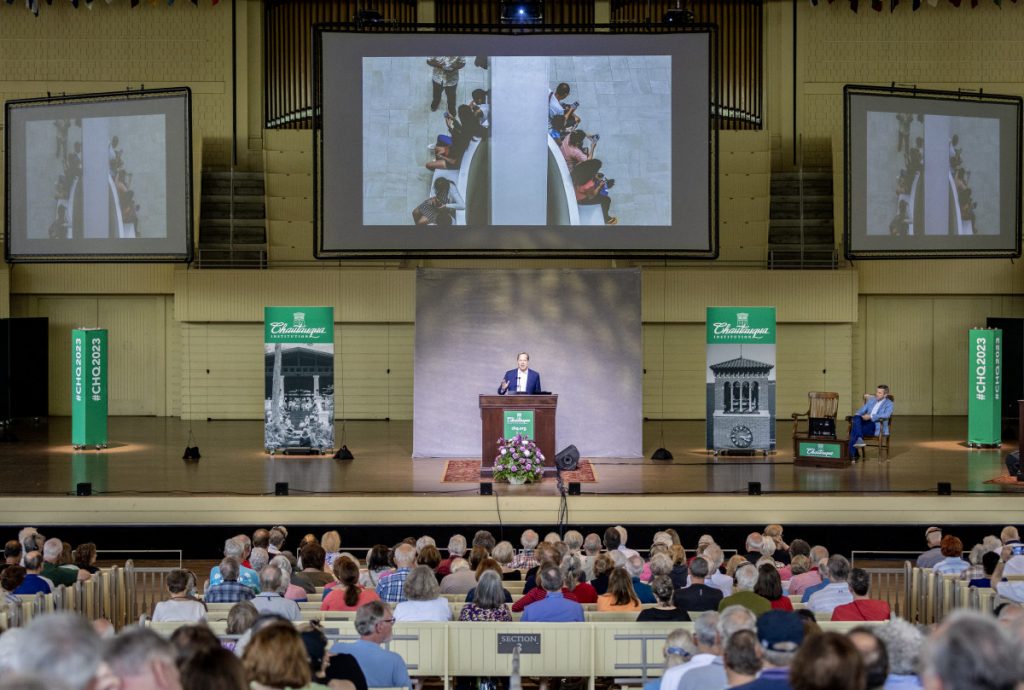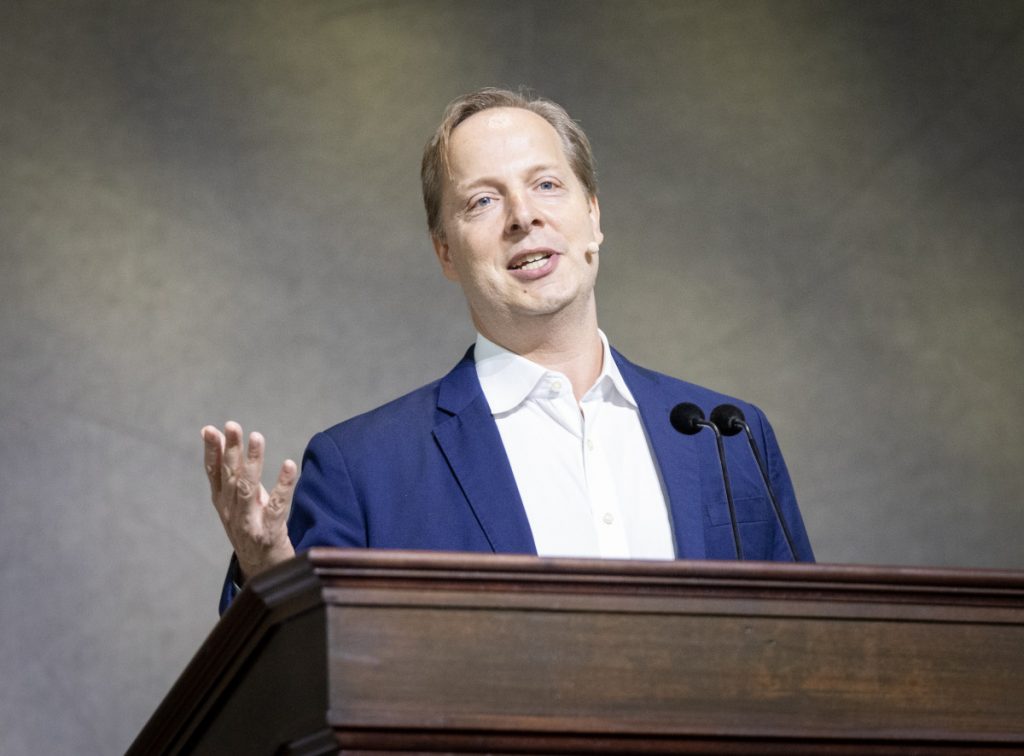
Alton Northup
Staff writer
In 1994, early in his journalism career, Almar Latour was an intern at The Chautauquan Daily; on Monday, he returned to the Institution to rally support for the profession he grew to love here on the grounds.
Latour, the CEO of Dow Jones and publisher of The Wall Street Journal, opened the Chautauqua Lecture Series Week Four theme, “The State of Believing,” by diving into the current state of trust in the news media, threats facing the free press and the responsibility to protect journalism in his lecture, “Dictators, Robots, Free Press and You,” at 10:45 a.m. Monday in the Amphitheater.
After Latour was appointed publisher of The Journal in 2020, he said he noticed an emptiness in the streets of New York and the newsroom as the pandemic kept people home. That emptiness, he said, was just the beginning as the country moved from crisis to crisis – the pandemic, near-economic standstill, social unrest, a contentious presidential election, political shifts, a new war and the fastest rise of technology in decades.
In the background of this chaos stood an erosion of trust in the news media, he said. A recent survey by Gallup and the Knight Foundation found that 50% of Americans believe news organizations intend to mislead, while only 25% believe journalists act in the best interest of the public.
Amid this declining trust, Latour argued there has never been a more critical moment for trustworthy reporting. Autocrats, changing technology, outdated business models and a growing indifference toward the role of the free press all threaten the existence of journalism.
“The harsh reality is that the stakes are high,” he said. “Without the free press, there is no free society.”
Latour pointed to countries such as China and Russia, where governments actively work to consolidate media under state control or influence, discredit reporting, arrest media workers or even kill them.
There were 533 media workers detained and 57 killed worldwide in 2022, according to Reporters Without Borders.
These statistics are personal for Latour. On March 29, Journal reporter Evan Gershkovich was on a reporting trip in Yekaterinburg, Russia, when authorities detained him on espionage charges — despite Gershkovich having accreditation from Russia’s Foreign Ministry to work as a reporter. The Journal and the U.S. government deny the charges against him.
“Evan has paid the price for a nation that turned its back on freedom,” Latour said.
Gershkovich, the son of Russian immigrants, wanted to tell stories about Russia’s people, culture, challenges and opportunities.
“His reporting in Russia is the kind of journalism that autocrats want to destroy,” Latour said. “Honest reporting, deep reporting, fair reporting, reporting that actually takes effort; reporting that changes minds.”
The efforts of autocratic governments to destroy the free press do not exist in a vacuum. By controlling who has access to information within the country, governments can also control what information gets out.
When Yevgeny Prigozhin and the Wagner Group launched a rebellion against Russian military leadership in June, Latour said U.S. media coverage was more focused on the missing Titan submersible than the ongoing mutiny. He characterized some outlets’ reporting in the days that followed as speculation, noting that accurate information was difficult to gather without reporters on the ground.

“Autocratic manipulation wants to keep you uneven, but wants you to do the dirty work and start censoring yourself,” Latour said.
The rise of technology, specifically generative artificial intelligence, makes it all the more easier for autocrats to disinform.
Generative AI, such as ChatGPT, has the capability to create text, images, videos and audio through simple prompts. During a demo at Dow Jones, Latour discovered he could create 4 billion images from just one prompt.
“Get ready for the landscape in which you will no longer know what to believe unless you are grounded by a trusted source,” he said.
AI does have a role in news media; The Journal has incorporated human-driven AI it calls “authentic intelligence” to scan data sets, write digital headlines and formulaic articles. Implementation of its use, Latour said, has freed time for reporters to focus on “distinctive journalism with an impact.”
Recent reports by The Journal uncovering Elizabeth Holmes’ startup fraud, the use of toxic lead cables across the country and a documentary on the Wagner Group weeks before it made global headlines have returned the organization to old-fashioned “shoe- leather reporting.”
Trust is front and center at The Journal, Latour said, and it works. Paid circulation has reached 5 million subscribers across Dow Jones, the highest in its history, and readership increases with the vulnerability index, a measure of a population’s exposure to hazard, showing why it is ranked the most trusted newspaper in the country.
“Our mission is really made for these moments and for times like these — to give people reliable information in times of confusion,” he said.
Latour said he hopes the success of The Journal, where 80% of the revenue is from subscriptions, can be scaled down to local news. The United States has lost more than one quarter of its newspapers since 2005, he said, leaving news deserts ripe for disinformation.
Latour attributed many of these failures to the long-standing practice of news media not charging for digital articles. Good journalism is expensive, he said, and it is important newsrooms recognize the value of their intellectual property.
“Truth is a business model,” Latour said.
He called on Chautauquans to support local and national news and invest in media entrepreneurs.
“We are not in normal times,” he said. “Be prepared to act; it is a civic duty to be informed.”




